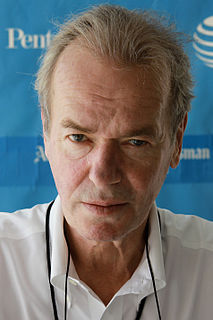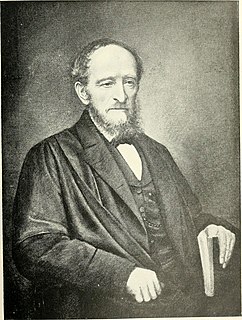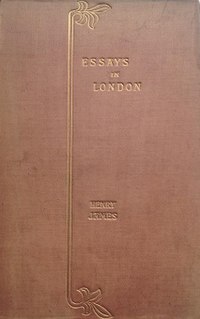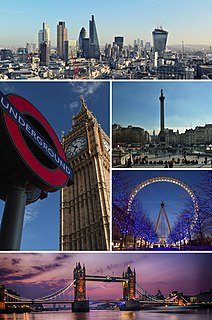
Washington Irving was an American short story writer, essayist, biographer, historian, and diplomat of the early 19th century. He is best known for his short stories "Rip Van Winkle" (1819) and "The Legend of Sleepy Hollow" (1820), both of which appear in his collection The Sketch Book of Geoffrey Crayon, Gent. His historical works include biographies of Oliver Goldsmith, Muhammad and George Washington, as well as several histories of 15th-century Spain that deal with subjects such as Alhambra, Christopher Columbus and the Moors.

Martin Louis Amis is a British novelist, essayist, memoirist, and screenwriter. His best-known novels are Money (1984) and London Fields (1989). He has received the James Tait Black Memorial Prize for his memoir Experience and has been listed for the Booker Prize twice. Amis served as the Professor of Creative Writing at the Centre for New Writing at the University of Manchester until 2011. In 2008, The Times named him one of the 50 greatest British writers since 1945.

Wallace Stevens was an American modernist poet. He was born in Reading, Pennsylvania, educated at Harvard and then New York Law School, and he spent most of his life working as an executive for an insurance company in Hartford, Connecticut. He won the Pulitzer Prize for Poetry for his Collected Poems in 1955.

John Earle was an English bishop.

Mark Pattison was an English author and a Church of England priest. He served as Rector of Lincoln College, Oxford.

The Catcher in the Rye is a story by J. D. Salinger, partially published in serial form in 1945–1946 and as a novel in 1951. It was originally intended for adults but is often read by adolescents for its themes of angst and alienation, and as a critique on superficiality in society. It has been translated into almost all of the world's major languages. Around one million copies are sold each year, with total sales of more than 65 million books. The novel's protagonist Holden Caulfield has become an icon for teenage rebellion. The novel also deals with complex issues of innocence, identity, belonging, loss, connection, and sex.

John Fiske was an American philosopher and historian.

John William Burgon was an English Anglican divine who became the Dean of Chichester Cathedral in 1876. He is remembered for his poetry and defense of the historicity and Mosaic authorship of Genesis and of biblical inerrancy in general.

This England is a quarterly magazine published in England. It has a large readership among expatriates. It concentrates on the traditional values and customs of the English people, particularly those of rural and small-town England.

Richard Jago was an English clergyman poet and minor landscape gardener from Warwickshire. Although his writing was not highly regarded by contemporaries, some of it was sufficiently novel to have several imitators.
Dennis Joseph Enright OBE FRSL was a British academic, poet, novelist and critic. He authored Academic Year (1955), Memoirs Of A Mendicant Professor (1969) and a wide range of essays, reviews, anthologies, children's books and poems.

The Sketch Book of Geoffrey Crayon, Gent., commonly referred to as The Sketch Book, is a collection of 34 essays and short stories written by the American author Washington Irving. It was published serially throughout 1819 and 1820. The collection includes two of Irving's best-known stories, attributed to the fictional Dutch historian Diedrich Knickerbocker: "The Legend of Sleepy Hollow" and "Rip Van Winkle". It also marks Irving's first use of the pseudonym Geoffrey Crayon, which he would continue to employ throughout his literary career.

Italian Hours is a book of travel writing by Henry James published in 1909. The book collected essays that James had written over nearly forty years about a country he knew and loved well. James extensively revised and sometimes expanded the essays to create a more consistent whole. He also added two new essays and an introduction.

French Poets and Novelists is a book of literary criticism by Henry James published in 1878. The book collected essays that James had written over the preceding several years. From an early age James was fluent in French and read widely in the country's literature. These essays show a deep familiarity with the techniques and themes of many French writers. The book also includes an interesting essay on Russian novelist Ivan Turgenev, who James read in a German translation.

Essays in London and Elsewhere is a book of literary criticism by Henry James published in 1893. The book collected essays that James had written over the preceding several years on a wide range of writers including James Russell Lowell, Gustave Flaubert, Robert Browning and Henrik Ibsen. The book also included an interesting general essay on the role of the critic in literature and a piece of travel writing about London.

Notes on Novelists is a book of literary criticism by Henry James published in 1914. The book collected essays that James had written over the preceding two decades on French, Italian, English and American writers. The book also contained a controversial essay, The New Novel, 1914, which passed judgment on various contemporary writers and occasioned much disagreement.

Joseph Jacobs was an Australian folklorist, translator, literary critic, social scientist, historian and writer of English literature who became a notable collector and publisher of English folklore.

Sussex pond pudding, or well pudding, is a traditional English pudding from the southern traditional county of Sussex. It is made of a suet pastry, filled with butter and sugar, and is boiled or steamed for several hours. Modern versions of the recipe often include a whole lemon enclosed in the pastry. The dish is first recorded in Hannah Woolley's 1672 book, The Queen-Like Closet.

The bibliography of George Orwell includes journalism, essays, novels and non-fiction books written by the British writer Eric Blair (1903–1950), either under his own name or, more usually, under his pen name George Orwell. Orwell was a prolific writer on topics related to contemporary English society and literary criticism, who have been declared "perhaps the 20th century's best chronicler of English culture." His non-fiction cultural and political criticism constitutes the majority of his work, but Orwell also wrote in several genres of fictional literature.

























